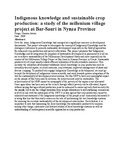| dc.description.abstract | Over the years, Indigenous Knowledge has emerged as a significant resource in development discussions. This project attempts to interrogate the concept of Indigenous Knowledge and the strategies it advances to promote sustainable development especially in the field qf agriculture for enhanced crop production and poverty alleviation. The project proposes that Indigenous Knowledge and its integration for purposes of sustainable development is paramount if at all we are to achieve sustainability of the Millennium Development Goals and more especially in the context of the Millennium Village Project at Bar-Sauri in Nyanza Province in Kenya. Sustainable productivity of crops usually entails efficient utilization of locally available resources.
This includes the utilization of abundant traditional (local) knowledge in crop production such as internally derived inputs, recycled nutrients, crop rotations, improved management of pests and diverse cropping. To productively engage Indigenous Knowledge in development, we must go beyond the dichotomy of indigenous versus scientific and work towards greater integration of the two for sustainability of development interventions. For the MVP to have any meaningful impact on the people of Bar-Sauri and its environs, the achievements must be sustainable.
The achievements of the MVP cannot be meaningful if the poverty of the region is not alleviated Since agriculture has been seen as the vehicle through which poverty can be alleviated, it goes without saying that agricultural production must be enhanced to ensure not only food security for the people, but to see the village transition from simple subsistence to self-sustaining commercial activity in line with the initial goal of the MVP.
It is also agreed that crop production cannot be enhanced and sustained if the indigenous knowledge of the people is not consciously harnessed It is along this line that this study centres on the role of synthesising the two knowledge systems for ensuring the eventual sustainability of the development intervention. Nevertheless, it is important to note that harnessing the local knowledge for sustainable productivity requires, among other things, systematic and detailed studies of local knowledge systems as well as understanding of contemporary scientific approaches in crop production. | en_US |

